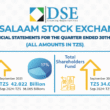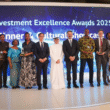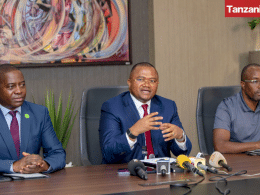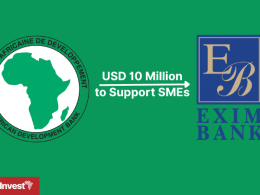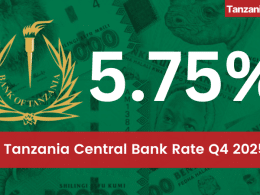TanzaniaInvest.com interviewed Standard Chartered Bank Tanzania CEO Liz Lloyd and she gives an insightful glimpse into the banking industry in Tanzania as well as Standard Chartered Group’s role in the Tanzanian economy.
TanzaniaInvest.com : What does Tanzania represent within the Standard Chartered framework for the African continent?
Liz Lloyd : Standard Chartered focus is on Asia, Africa and the Middle East. For the first time last year, we gave our investors a presentation on Africa. They are so interested in Africa and the prospects of Africa. There is a lot of attention on Africa. There is a lot of investment coming in.
Within that Tanzania has an excellent track record of economic growth and good prospects for the future.{xtypo_quote_right}…Tanzania has an excellent track record of economic growth and good prospects for the future.{/xtypo_quote_right} I would say, the Standard Chartered Group as a whole, has a lot of potential in Africa and within Africa there is a good focus on Tanzania.
TI :You mention economic growth, there are many countries throughout Africa that have noticeable growth and some countries are even higher than Tanzania, standing on 7% GDP growth. What makes Tanzania attractive?
LL : One of the things that make Tanzania attractive is the diversity of the economy. It is quite balanced.{xtypo_quote_left}One of the things that make Tanzania attractive is the diversity of the economy. It is quite balanced.{/xtypo_quote_left} There is manufacturing, agriculture, service etc. It is unusual to have such diverse strength and it gives Tanzania a strong economy.
The other thing which is notable is the demographics in the country, which is education. As we see in Asia that can be a very positive thing. Thirdly, there is potential for resource exploitation which I think is another dimension.
TI : What is your main position in this country and your main niche?
LL : Here we are a full universal bank; we have a corporate business, SMEs business and retail business. The connection with the rest of the world is rippled out in Tanzania in East Africa. The connection between Tanzania China, Tanzania India, Tanzania Korea; there are very few banks who can say they have a 100 branches in China as well as a good presence in Africa. We have very good contacts with all of the trading partners of Tanzania.
TI : Tanzania has 50 banks, can you perfect all aspects of banking with such intense competition?
LL : Standard Chartered Group has 10 years of record growth and that is being sticking to a strategy. That strategy on the wholesale banking side is client centric and on the consumer banking side it is also customer focused. That is what we are going to provide in Tanzania as well.
We are going to make sure we provide all the services we can to corporate banking clients, there are also a lot of investments going into technology for consumer banking.
TI : Corporate Banking seems to be a priority for the largest banks in Tanzania. What is that will make an International Bank more appealing apart from its network?
LL : The network is vital. Also the capability; we do have a network of specialists, whether that is oil and gas, agriculture, trade and so forth. We have a huge degree of specialist capability which we can draw on for Tanzania.
TI : What are your ambition and objectives for Standard Chartered Bank Tanzania?
LL : The first one is sticking to strategy, having a sound balanced sheet, that is absolutely crucial. It means we are well positioned, we can do business with clients. We have a strong dollar balanced sheet and local currency. That gives our clients opportunity and to do the kind of business they want.
So we have a good relationship with our customers, we help them grow. We stood by our local customers. Lastly, is our focus on investment in digitalization, in mobile, in upgrading where we investing in ATMs, in electronic banking units, in cheque deposit machines. We have always been in ahead in digital capability regardless of what device is used.
TI : So strong balance sheet, IT and client relationships?
LL : Yes.
TI : Do you have a specific growth rate that you have to reach?
LL : No, not in that sense. We will continue to support our customers.
TI : What are the challenges ahead for you in this country?
LL : I think there are many challenges which are common to many countries in Africa. For example, infrastructure and power; those are the common issues you come face in many African countries, and that is the case here too.
TI : You mention technology and in Tanzania there is the mobile money revolution, M-Pesa. At that same time the key issue is financial inclusion. How do you see the Telecoms mobile money service and the challenge of financial inclusion affecting the banking industry?
LL : The Telecoms industry has undoubtedly changed the banking dynamics and mobile money. We think about our customers and how they want to do banking. Some of them want to come into branches while want to access their banking from outside and as conveniently as possible but also making sure there is personal touch.
So I think all of the technological changes is definitely going to change banking. Technology is helping us serve our customers better. As for the financial inclusion side of things, I think that is absolutely right and the more people who can be included through formal mechanisms into a payment system, the better. Many banking services link up with mobile banking systems, they are very compatible.
TI : Do you think it is conceivable to see a bank merger with a telecom company?
LL : I think the other thing which many countries grapple with, is the regulatory framework. So at the moment you have set regulators.
TI : So there are certain things you can do with telecoms and other things can only be done at a bank?
LL : Yes.
TI : In addition to financial inclusion in Tanzania, what is Standard Chartered’s role in Corporate Social Responsibility?
LL : The first thing I would say is the basic, core banking. Providing credit, looking after people’s money is helpful to the economy and to society. The way you go about that is also really important. We have an ethos at Standard Chartered “Hear for Good” and that influences all our decision-making. In terms of community initiatives we invested about 3.2 billion TZS in the community, largely on health, education and young people.
We also encourage employee volunteering, every employee has up to 3 days a year to volunteer, we do all sorts of things with that. Whether it’s going to schools and talking to girls about how they can succeed and careers, to more basic environmental cleaning up initiatives. This is part of Standard Chartered ethos.
TI : Which are the main sectors in Tanzanian economy that you expect to do the most business with?
LL : All of them. Telecoms, mining, agriculture, tourism, trade, oil and gas, services and so forth. We have expertise in all of them. That is the benefit of Standard Chartered. We have expertise in all these sectors.
TI : What do you think Tanzania is about, how would you describe the socioeconomic development here and what would you advise investors wanting to do business in Tanzania?
LL : Tanzania has steady growth. I really think the diversity of the economy is off interest. There is so much going on in the country in pretty much any sector you are interested in. It is a land where there are a lot of opportunities.{xtypo_quote_right}There is so much going on in the country in pretty much any sector you are interested in. It is a land where there are a lot of opportunities.{/xtypo_quote_right} From a personal point of view, it is a stunning country, it is vast, there are all sorts of places to explore. It is a nice place to live. People are very welcoming and friendly. You are given a very warm welcome here when you come.

